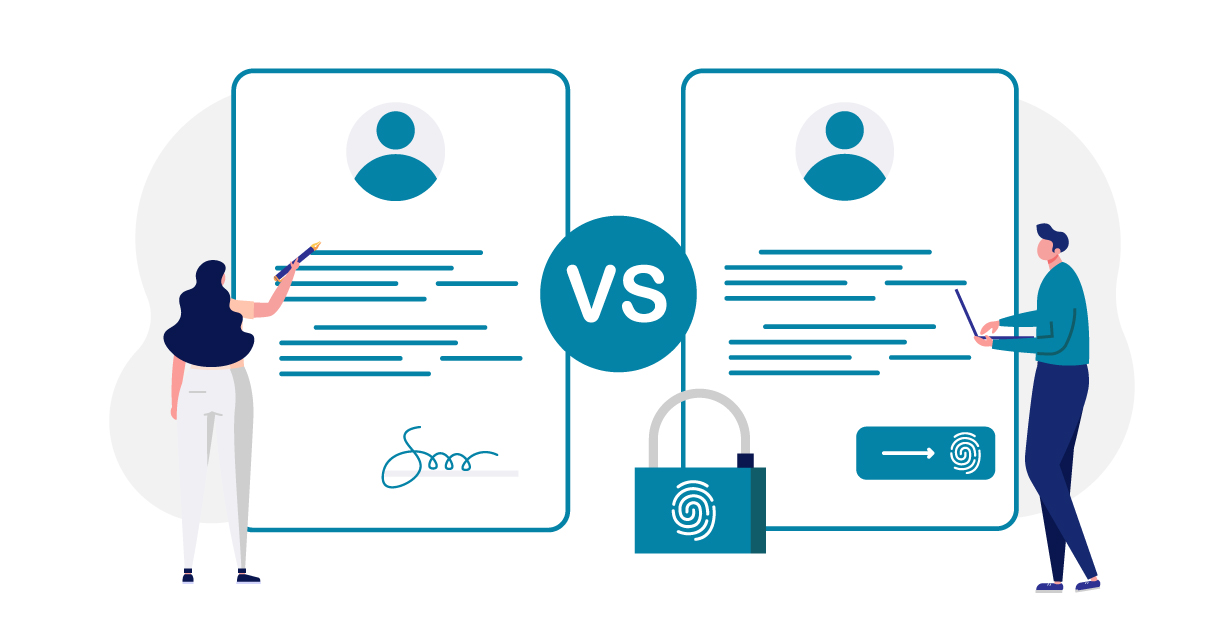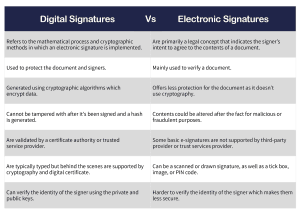Home | News and Insights | The Difference Between Electronic Signatures and Digital Signatures

20th Apr, 2022
If you’ve signed a document digitally, there’s a good chance you’ve already used an electronic or digital signature. With traditional ‘wet’ signatures quickly becoming outdated in the modern workplace, more and more businesses will now be considering a more modern, digital alternative.
Whilst the terms electronic and digital signature are often used interchangeably, they are in fact two different ways of signing a document. In this blog, we’ll be discussing the differences between electronic and digital signatures, as well as the key features and benefits.
In the most basic sense, a digital signature refers to the specific technical way in which electronic signatures are implemented. Digital signatures rely on encryption technology, which offers greater security and authenticity.
Digital signatures offer a tamper-proof way of signing digital documents. They also ensure your signer is fully verifiable by linking them to the transaction. To digitally sign a document, you will need a trusted certificate authority or trust service provider. These third-party providers are the ones that validate your digital signature.
Whilst you don’t need to know how a digital signature works to use one, it does demonstrate how secure these kinds of transactions are. Most digital signature providers will comply with a Public Key Infrastructure (PKI) to securely transfer data from one party to another. This uses two ‘keys’ (long numbers generated by an algorithm) to encrypt and decrypt the documents.
When you sign a digital document, an algorithm then creates what’s called a hash- data that is unique to a signed document. This is then encrypted by the signer’s own private key. This encrypted data is what forms a digital signature.
The signed document can then be decrypted on the recipient’s end using a public key (or digital certificate). This generates a second hash, which is then compared with the original. If they both match, then the document is valid. If the contents of the document are changed or tampered with, however, the two hashes will be different and the document will be invalid.
For us signers, we just need to know this: digital signatures use encryption, keys, and hashes to keep transaction secure and ensure that signatures are valid and authentic.
A digital certificate also referred to as a public key certificate is an electronic file that contains the public key of the sender and information that identifies the signer. Digital certificates are issued by a certificate authority and are sent alongside the signed document, with the public key then used to decrypt the document.
Digital signatures can bring a number of benefits to your business, including increased productivity and efficiency, reduced turnaround time and streamlined processes. Yet, electronic signatures can also help businesses benefit from digital ways of working. Thanks to the mathematical processes and cryptography technology, digital signatures demonstrate:
As digital signatures go through greater lengths to record transactions and verify identity, they’re considered to be more secure than regular electronic signatures- which for many businesses and sectors, makes them the preferred choice.
In comparison to digital signatures, basic electronic signatures are a lot simpler; they’re essentially a digital version of an ink signature. An electronic signature can be anything from a typed/drawn out name, a tick box plus declaration, symbol, or PIN. The eIDAS defines simple electronic signatures as “data in electronic form which is attached to or logically associated with other data in electronic form and which is used by the signatory to sign”.
Digital signatures definitely win out in terms of security, integrity, and authenticity. This makes them best suited for use in business transactions, particularly where sensitive information or high-value transactions are concerned.
With a digital signature on the case, you’ll have peace of mind that your signer is who they say they are and that your document cannot be tampered with. You can also be sure that the transaction details will be recorded by your signature provider.
Whilst digital signatures are significantly more secure than basic e-signatures, that doesn’t mean that they don’t have a place. For more casual documents or agreements, sometimes a tick box plus a declaration or drawn signature is enough to signal agreement, such as when you collect a parcel or agree to the T&Cs on a website.

If you’re looking for a secure and authentic digital signature for your business, get in touch with E-Sign today. We can offer a secure digital signature to keep your documents and transactions safe from fraud and malicious activity.
Our range of digital tools ensures your business has the technology it needs to enable digital ways of working, secure digital signing, and automated workflows. Let’s take a closer look at some of E-Sign’s features:
Digital Signature
Our electronic signatures are supported by a Digital Signature Certificate and advance audit trails. This means that your signatures can be verified with additional documentation, detailing information such as the author, signers, devices used, IP addresses, time, date stamps and much more.
Connectors and APIs
We understand that your digital signature will need to work well with all your other business applications. With our range of connectors and API integration, you can create a bespoke digital ecosystem to create, e-sign and store your documents, as well as manage transactions.
ID Verification
Verify the identity of your signers to minimise the risk of fraud and ensure your transactions are secure. Your signers will need to enter personal information before they can view and sign a document. This is then checked against our live global ID database to verify their identity.
Try our digital signature and complete digital toolbox for free with our 14-day trial.
E-Sign is a leading provider of digital transaction management solutions, supplying professional services including Electronic Signatures, Web Forms, ID Checker, Verification Tools, Personalised Emails, API, and Payment Processing to businesses of all sizes across the UK.
To find out more about our E-Sign solutions and how they could transform your business, get in touch with us today.